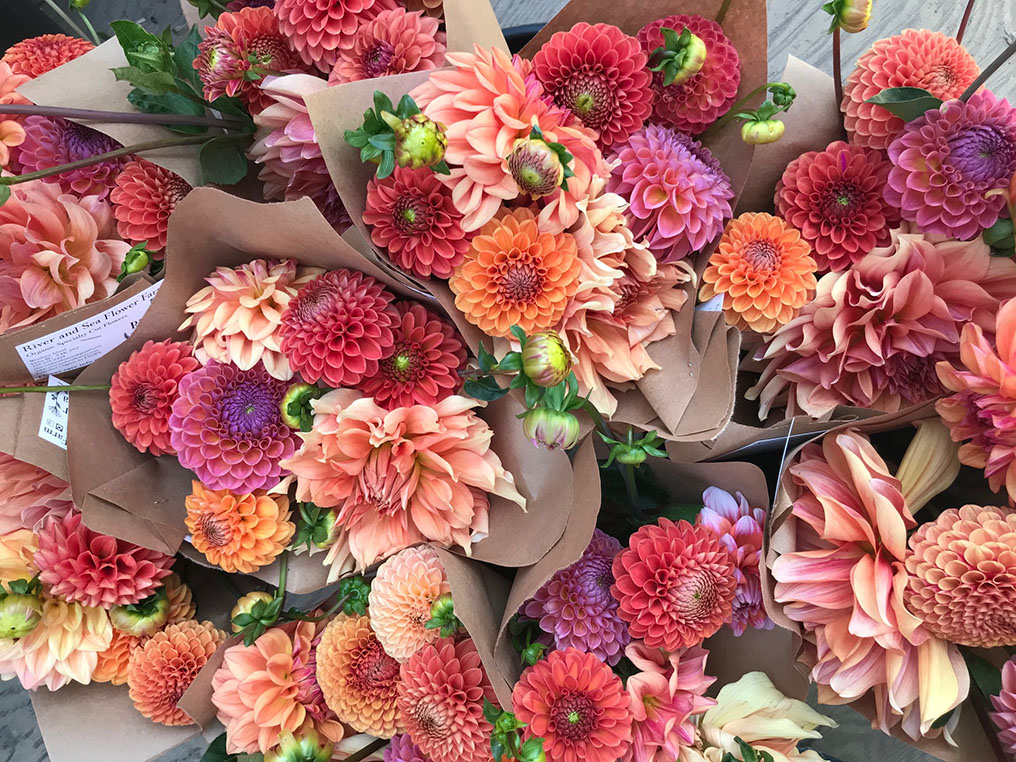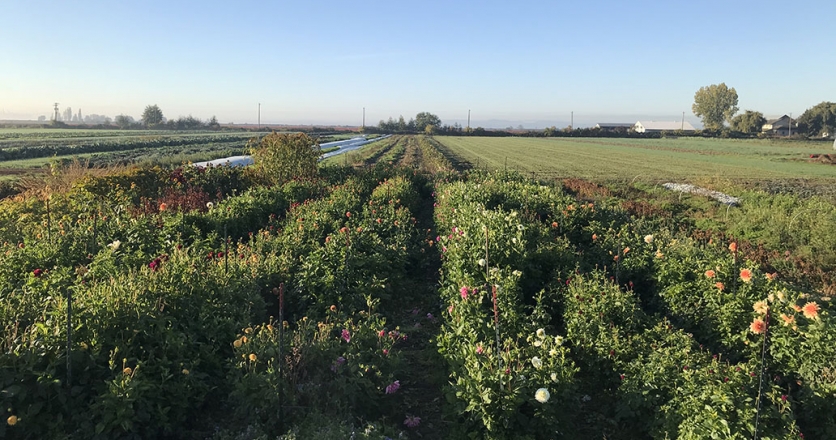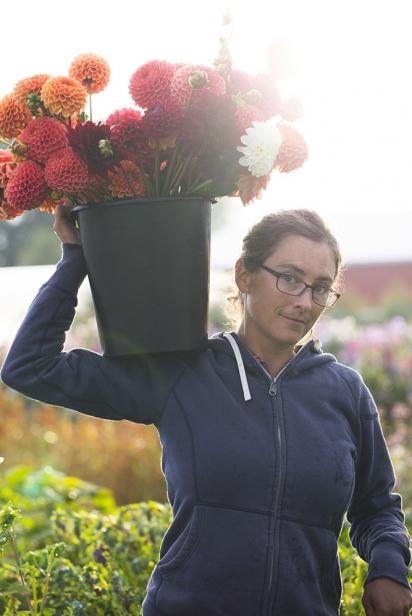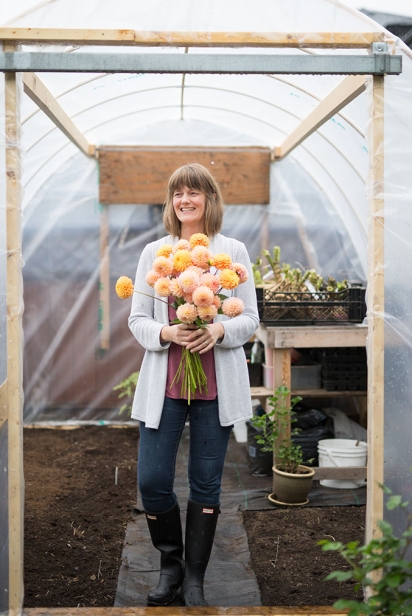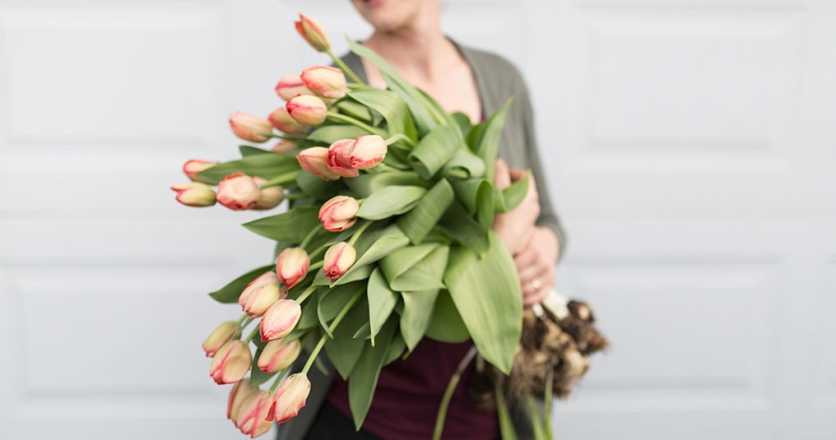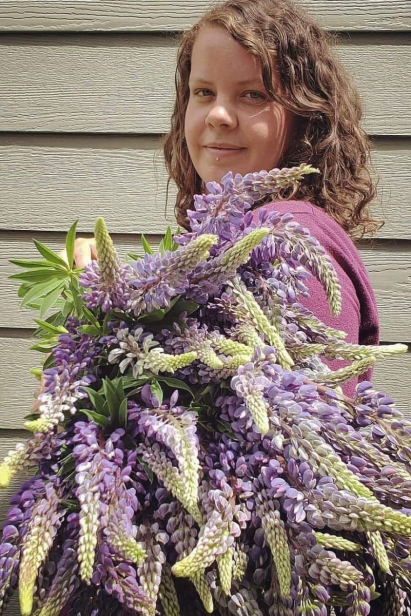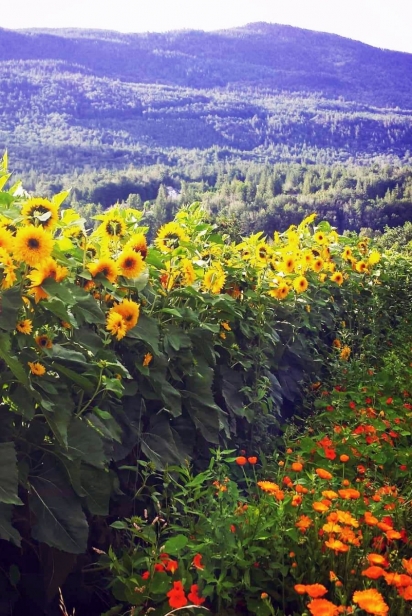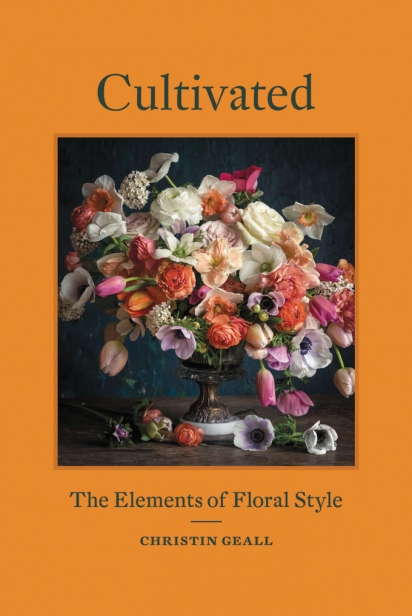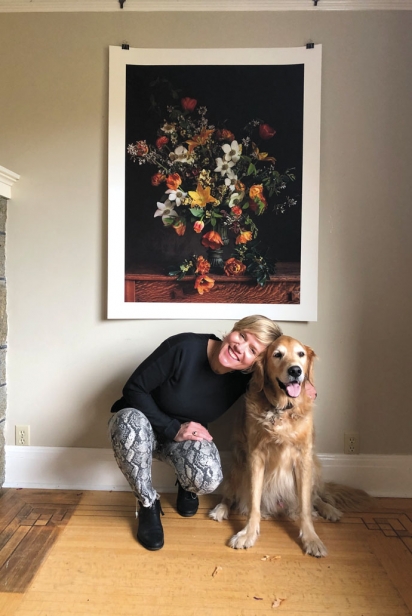A Boom for Blossoms
Blossoming spring flowers likely meant more to British Columbians this year than ever before, cheerful signs of hope and renewal just when we needed them.
Since the garden won’t wait for a crisis to pass, the women flower farmers running small-scale operations The Front Yard Flower Company, Moonbird Farm and River and Sea Flowers knew they had to do things differently under a global pandemic.
It’s tough enough to make a living as a farmer, where a 14-hour workday isn’t unusual. COVID-19 brought more challenges. Would shoppers care about fresh-cut local tulips and daffodils when they only had canned beans and hand sanitizer on their lists?
“Like everyone else, it was scary at first and a bit of a panic, then onto what are we going to do? We have a greenhouse full of flowers coming on,” says Rachel Ryall of River and Sea Flowers, located on Westham Island in the mouth of the Fraser River near Ladner.
Small, urban farms didn’t take the same big hit large flower growing operations and florists suffered when the spring and summer wedding and event season was cancelled, sending the estimated $12 billion global cut-flower trade crashing.
Their challenge came when the British Columbia government allowed farmers’ markets to open with social distancing, but prohibited flower and craft sales. Markets are a significant earner for producers of locally grown, cut flowers, which were already starting to bloom when the market ban came into effect.
“At first, I was a bit heartbroken,” says Moonbird Farm owner Caitlin Shaw, 30, whose small farm is behind her home in the Yarrow Ecovillage, near Chilliwack. “We’re not an essential service. Who’s going to buy flowers?”
But then the unexpected happened. A craving for colour and beauty amid lockdown revealed fresh flowers were seen not as an extravagance, but an emotional essential service for people stuck at home.
Subscription sales have helped cover some of the farmers’ market void for small flower-growers. With these bouquet versions of the popular pre-paid CSA (Community Supported Agriculture) subscription vegetable boxes, clients pay upfront for a portion of a seasonal flower yield. During COVID, they can grab their orders from a driveway or stand outside the farm.
Rose Dykstra of The Front Yard Flower Company also delivers to some of her Vancouver subscribers.
Meanwhile, some florists stayed open and are doing deliveries. Local flowers filled the imported bloom gap at a time when customers are increasingly asking for B.C.-grown flowers to support local farmers and lessen the carbon footprint of shipped flowers.
Dykstra says this could be the best year yet for her Front Yard Flower Company business. She cultivates flowers in three front yards in her South Vancouver Sunset neighbourhood, including her own home. She also leases a small, vacant city lot, along with a compact former vegetable farm plot in Richmond, about a 10-minute drive from the house. It adds up to about an acre where she grows about 400 varieties of flowers.
Subscribers can get seasonal, weekly-to-monthly mixed bouquet options, ranging in price from $77 for a once-a-month bouquet for July, August and September, up to $296 for a full season of blooms. There’s also a CSA devoted to those summer showstoppers, dahlias.
“I haven’t looked at my numbers since this time of year is kind of crazy,” she says. “I’m just heading into my third year, so I am still in the start-up phase of getting all the farm infrastructure into place. Things have been steadily getting better each year, but I think COVID has accelerated that this year.”
Ryall says as of mid-spring, business was about the same as last year, with only a small section of the farm being harvested before the growing season truly kicks in. Looking ahead, florist wholesale numbers are down. Weddings are being cancelled. The seasonal buckets of bridal flowers for DIY weddings are on hold for now, but some florists are taking her cut flowers for delivered arrangements and bouquets.
“Having to overhaul our sales channels has taken a lot of work and I’m getting behind in other things as I try to manage it,” she adds.
In addition to River and Sea CSAs, customers can now order bythe- bunch blooms like showy ranunculus and Icelandic poppies online for weekly pick-up.
“It’s a stressful time for so many people,” Ryall says. “Having a touch of beauty is something people need.”
“People are at home and have more time to enjoy the flowers,” says Dykstra, a 42-year-old former wedding photographer. “All around me the flower industry has been crashing and my counterparts on (Vancouver Island) are selling out of flower subscriptions. It’s been overwhelmingly good.”
She has continued wholesaling to local florists and posts regular COVID updates on her website.
“Shockingly, it’s been going really well. People have been very supportive,” says Dykstra, who started farming with a backyard vegetable garden in her childhood home, switching to flowers in 2017. She still lives in the house where she grew up, with her husband and their 10-year-old son.
Family inspired her passion to try urban farming. Her 92-yearold dad, who lives upstairs from them, was an avid backyard vegetable grower who filled trellises with fragrant sweet peas. Her grandmother, who used to live next door, grew plum trees, vegetables and dahlias.
Concerns about food access for her family prompted Dykstra to add some vegetables this year, including tomatoes, kale and leeks.
She farms organically, but isn’t certified. Dykstra doesn’t use pesticides and relies on organic fertilizer, fish meal and compost tea sprays to keep plants and soil healthy.
Ryall, 37, started River and Sea Flowers in 2016. She’s the daughter of now-retired commercial greenhouse vegetable growers. Her flower farm is on the same family land as her sister Lydia Ryall’s Cropthorne Farm, which produces vegetables and pasture-raised poultry eggs. Both farms are certified organic.
“I think people are starting to realize it’s not just about the food you eat and put in your body, it’s also about the chemicals,” Ryall says of why organic flowers make sense.
After she finished university, Ryall started working with Lydia at Cropthorne before starting her two-acre flower farm. Not all of the land is under cultivation.
She grows about 70 different kinds of flowers, including her favourite, dahlias. She has about 80 varieties of her beloved showy beauties. Ryall says the numbers keep growing because she can’t let go of any of them and there are always new varieties she wants to try. With her and dahlias, it’s a personal relationship.
“I haven’t seen their faces in so long,” she says of the colourful blooms that will grow from the tubers that have been wintering indoors. “You see the same plants year after year.”
Her two daughters, Isla and Adelaide, are often in the field with her. “They’ve grown up doing this,” she says. “They know all their flowers and varieties the way other kids know their princesses.”
To her delight, subscribers have been making weekly trips across the 100-year-old little wooden bridge from the mainland to visit the Cropthorne farm stand to pick up their bouquets and cut flowers ordered online. She sells out each week.
“I was so excited by the number of orders,” says Ryall, who typically sold her flowers at various Vancouver farmers' markets, including Riley Park, Kitsilano and West End. “People want to support each other, whether it’s me with a small business, or dropping off flowers for family and friends they can’t see,” she says.
When Shaw saw her daffodils making their spring appearance at Moonbird Farm, she made up 20 mason jar bouquets of the early blooming flowers and pussy willows, with an imported dusky pink rose tucked in for an extra pop. She put the word out on Facebook, Instagram and a community email. They sold out at the roadside in minutes. “It felt magical that morning,” she says.
Shaw’s certified organic mini-farm is located on a one-thirdacre plot behind her rented home in the Yarrow Ecovillage, a community of 33 residential units and 20 acres of farmland in the Fraser Valley.
A former sous chef at Burgoo Bistro in Vancouver, working in the food industry gave her the idea of having her own farm. She started small, with some four-by-four boxes on either side of a sidewalk outside her East Vancouver apartment where she grew potatoes, strawberries and corn.
“Farming was my light in the darkness,” says Shaw, a single mother of two who decided to pursue a more ambitious farm plan while spending time on Mayne Island with her mother three years ago. One night as she sat looking at stars and the moon, she heard a bird singing and it came to her: “What about that farm dream?”
Moonbird Farm started to take shape when she found a rental unit at Yarrow Ecovillage. Her neighbour, farmer Miranda Chiasson, taught her the basics and got Shaw started on a small plot at her Sweet Earth Farms. Chiasson sold Shaw’s bouquets at her stand at the Riley Park Farmers’ Market. Customers started coming specifically to buy flowers.
“That was when I knew this was my path,” Shaw says. She started her own flower farm two years ago.
Shaw had success selling bouquets and cut flowers at the Friday night Yarrow Farm Market last year. The happy faces of sunflowers and “funky” snapdragons in lavender and sunburst orange are her favourites. She wants to try roses next year. Her 20-member flower subscription runs from June to September.
Her neighbours make up most of her clients. Numbers are down about 25 per cent from last season.
“I’m not too concerned though, as I’ve had a lot of interest in seasonal flowers from local florists,” she says.
Initially, Shaw says, she had no idea where cut flowers came from. The more she learned, the more she was convinced the reliance on imported flowers has to change.
She does all her tillage with a broadfork, a kind of expanded rake with long tines and tall handles on either end that the farmer stands on to work the soil.
“Broadforks turn and deeply aerate the soil without destroying delicate soil structures and micro-organisms. They also give you a great workout,” Shaw says. “I turned to the broadfork because of my fears of machinery but also [for] less reliance on fossil fuels.”
She believes customers are starting to understand the why of organic flowers, which yield robust blooms without harming the environment.
It’s also a win for the beekeepers in the Ecovillage. No pesticides mean sweet nectar and a happy bee population. “The field is buzzing mid-summer,” she says.
When COVID-19 hit, Shaw decided to devote half her garden to vegetables and herbs, figuring those would be the money-makers this year.
She’s also growing what she likes to eat: Lacinato kale, broccoli, strawberries. “I looked at the seed catalogue and I think I was hungry when I did it,” she says.
The next challenge for these flower farmers is sustaining their success.
“I feel like people have an appetite right now to support farmers and local,” Dykstra says. “Once this is over, I really hope this can continue.”
The Front Yard Flower Co.
635 East 54 Ave., Vancouver, B.C.
thefrontyardflowerco.com | 778.996.7673 @thefrontyardflowerco
Moonbird Farm
42312 Yarrow Central Rd., Chilliwack, B.C.
facebook.com/moonbirdfarm | @moonbirdfarm
River and Sea Flowers
4362 Tamboline Rd., Delta, B.C.
riverandseaflowers.com | 778.877.2224 | @riverandseaflowers
Victoria flower grower, floral designer, writer and photographer Christin Geall wasn’t supposed to be spending the summer tending her urban garden.
She intended to be on the road, promoting her new book Cultivated: The Elements of Floral Style. With a March 24 publication date, Geall had an international media tour ahead, along with a floral design workshop at a French chateau.
She was teaching at the New York Botanic Gardens in mid- March when the COVID-19 pandemic escalated and she had to return home.
Geall is philosophical about the sudden about-face. “I certainly have had more time to garden,” she says.
She’s busy with the one-third acre flower farm around her Oak Bay home and said she’s been “crushed with business,” since British Columbians began staying home.
At first, she was selling bouquets curbside at her house, as well as doing her signature naturalistic custom arrangements for clients.
“That led to almost too much business for me,” she says.
Demitasse Café and Garden centre in Oak Bay is back selling her bouquets, taking the pressure off Geall to sell from home.
“When people can’t be with loved ones, I know that’s where the bouquets are going,” she says.
More consumers are asking for locally grown flowers, a trend that pleases Geall. “They’re more reliable,” she says of domestic blooms. “In the end, it speaks to the same questions of food security.”
Internationally known for her photography featuring British Columbia-grown flowers and plants, Geall began a new series of prints under COVID-19: The Sanctum Series. She’s photographing floral designs placed inside wooden frames and boxes, a nod to social distancing and the times.
The good news is, pre-orders for Cultivated: The Elements of Floral Style have already sent the book into a second printing. A fall promotional push is planned for the book. And one of her Sanctum Series photos will be used for a 1,000-piece jigsaw puzzle — a perfect intersection of Geall’s art and a favourite pastime of homebound British Columbians.
For more on Christin Geall, go to cultivatedbychristin.com.


